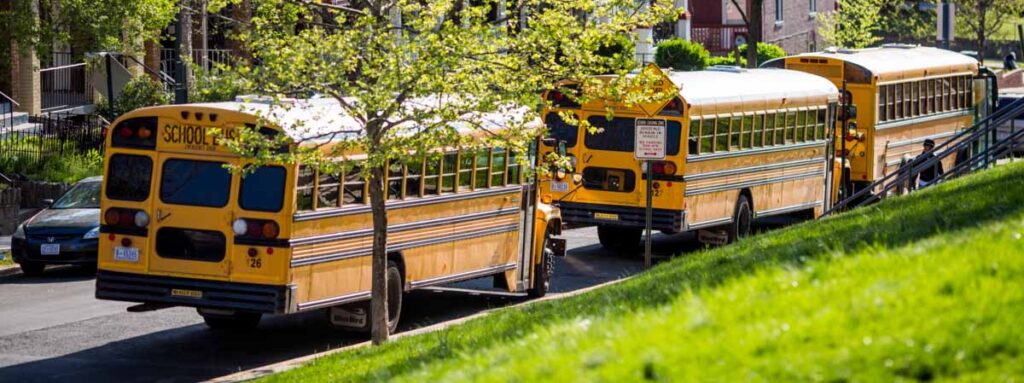Speak UP is a Los Angeles based grass-roots organization supporting families in advocating for excellent, equitable public education.
Emily Gold is Director of Parent Engagement and Community Partnerships at Speak UP as well as a Los Angeles Unified School District parent.
In our recent report, The Opportunity Myth, we discussed the importance of families as advocates for their kids’ school experiences. Today, we talk with Emily about what this looks like in practice, as well as what she’s heard from families about what they want for their children and expect from their schools, and how educators can be better partners.
Tell us a bit about Speak UP.
We serve as the voice of parents in LAUSD. We help parents advocate for their kids’ access to a high-quality education, and for parents to have a voice in the decision-making process, all the way from school decisions up to decisions made at the policy level at LAUSD. From our perspective, kids don’t have lobbyists, kids don’t have unions—kids have parents. And parents are really the only people whose sole interest is the success of our kids.
What are some of the things you’re doing to elevate parents’ voices?
Our end goal is that we want parents informed and engaged when it comes time to vote. When we started Speak UP, one of the things we were most alarmed by was just how few parents actually know about school board elections and vote in them. We have a large focus on making sure parents engage in the process of electing school boards, state superintendents, and any elected official who makes decisions about schools and education policy.
How are you encouraging them to go out and vote?
We do traditional organizing, meeting with parents one-on-one or at house parties where we bring families together. We hear about their experiences at local schools and learn about what’s important to them. And then we tie that back to decisions made at the school board level; helping parents understand the connection between school board policies and the decisions made at their local schools.
We also have a communications and social media piece, where we work to keep parents informed about the decisions made at LAUSD. And then we also have a number of community partnerships where we work alongside other organizations.
This fall we’re going to begin providing workshops to parents in their communities. We’ve developed a series of three workshops that cover everything from understanding how LAUSD operates and where the points of influence are, to the elections. We’re working to help parents understand the power of not only their individual voice but the collective voice of parents, and uniting across the district to advocate for high-quality education for all students.
What are some things you consistently hear from parents about what they want from schools?
What we hear over and over is that parents want to be partners in their children’s educations, and to do that they need information and access. As we know, kids spend more time at school than at home, so it’s important that when parents drop their kids off at school, it’s a place kids feel welcome and embraced and cared for and valued. Parents want a great education for their children and a holistic approach—so strong academics, but also meeting their kids’ needs socially and emotionally. Parents want their kids to enjoy school. And parents want more communication and transparency. They want to hear from teachers and administrators, as well as board members and district employees.
Can you talk more about transparency?
One of our parent engagement coordinators is a mom with two kids, both of whom have Individual Education Plans (IEPs). She’s a big advocate in the special needs community, and she focuses on special needs issues here at Speak UP. She’s developed a workshop that talks explicitly about the rights of kids with IEPs and their families, as it relates not only to federal law, but also the IEP process. So, we have a strong presence in that community. Some of the parents this parent engagement coordinator works with have kids who went to a local public school designed specifically for students with severe special needs, from elementary through high school.
Then, a number of years ago—and it’s still not clear exactly when this decision was made—the school board decided to make it more of an integrated school, so you would have the students with IEPs along with the general education kids, learning together. But, to make room for the general education students, the school began kicking out students with special needs and transferring them to different schools once they reached sixth grade.
The problem here was twofold. First, the district never actually told the parents about the plans to integrate the school. And second, once the kids were transferred, parents had no way of knowing how equipped their child’s new school was to meet their needs, and in most cases, the schools were far from adequately prepared—especially to serve kids with high special needs and severe medical challenges.
It would have been ideal to have been involved in the decision-making process years before this happened, but at the very least the district should have kept parents informed about the decisions that affected our kids.
To be clear, we believe that integrating special education schools and classrooms is positive and important. It was not the integration itself that was the problem—it’s the process by which it was done.
Why is it so important that parents are part of the decision-making process?
A big thing we hear about is that parents know who the great teachers are; the ones they want their kids to have. But we don’t have any formal process of evaluating how teachers are performing and how kids are learning that involves the parents and takes advantage of their insight. As a result, we have things like seniority-based layoffs—a policy that was made without any parent input—where parents are often losing their favorite teachers.
When it comes to the labor negotiations, there’s no voice of the parents, anywhere. A union represents every employee in the district, but no one’s representing the voice of the students—that would be the parents, but parents do not have a seat at the table.
When I look at our schools, I often ask myself, “Are we putting kids first or are we putting adults first?” From our perspective, we think all decisions should be made with the best interest of the kids at the center, which means making sure that parents’ voices are involved in the process. So, my advice to educators is to talk to parents. Data is helpful, but the only real way to know what parents want is to ask.
Read more about improving students’ school experiences in The Opportunity Myth—then take the first step by requesting your own free action guide featuring tools and advice to help more kids have worthwhile experiences in school.





